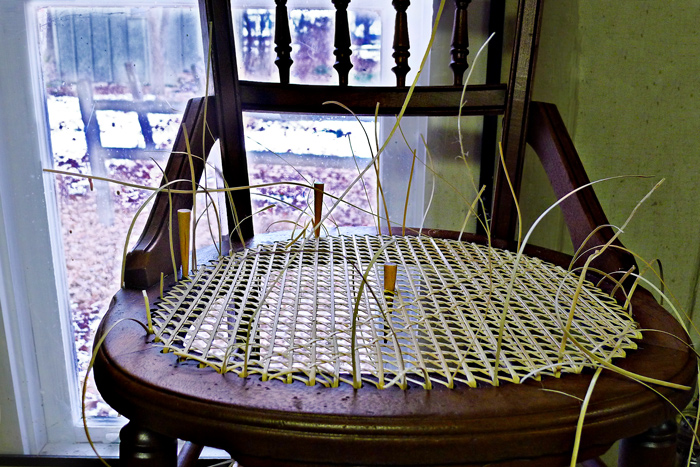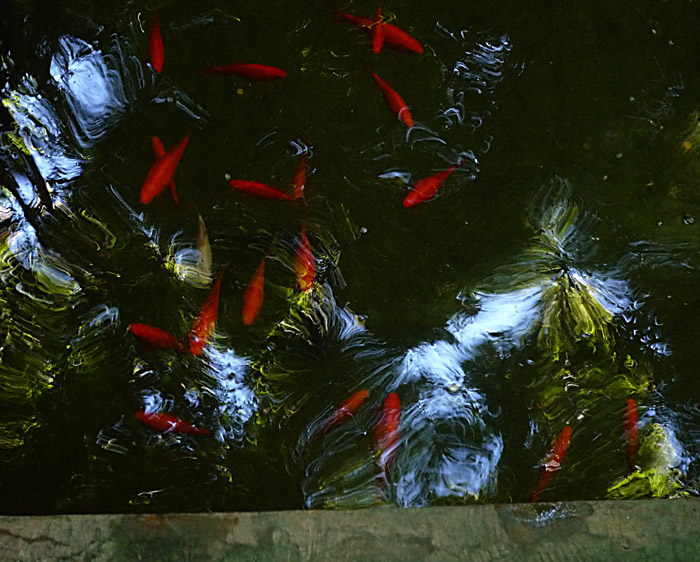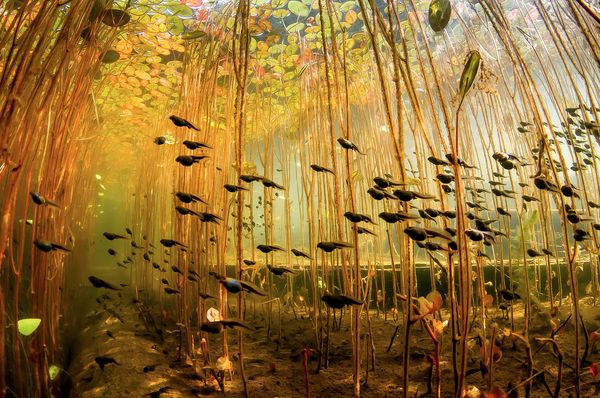Hole in the Clouds
Feb 16, 2012
 Another hour's work, and Bernard Zike will have the seat of this chair completely restored. People from all over New England bring worn-out old chairs to Bernard's workshops in Warren and Portland, Maine, where he and his partner, Marion Puglisi, work centuries-old caning and rushing techniques, often with reeds they've harvested themselves from local ponds.
Another hour's work, and Bernard Zike will have the seat of this chair completely restored. People from all over New England bring worn-out old chairs to Bernard's workshops in Warren and Portland, Maine, where he and his partner, Marion Puglisi, work centuries-old caning and rushing techniques, often with reeds they've harvested themselves from local ponds.
Would-be apprentices from all over the country seek them out in hopes of mastering the craft, though many will give up their dreams when they learn how much patience is required. After more than twenty-five years of experience with traditional tools and all kinds of natural seating, it still takes Bernard almost a full day of work to repair a single chair bottom.
This is one of Bernard and Marion's winter chairs; it will spend the winter in their shop. It belongs to some of Maine's summer people, who drop off broken chairs when they close up their summer homes in the fall, with the expectation that when they reopen their summer homes next spring, they can reclaim the chairs, and they'll be good as new.
Maine
Marion Puglisi
work
Bernard Zike
caning
chair
pond
cattails
rushes
antique
Dec 6, 2012
 Fish swim amongst rippling reflections in Yves Saint-Laurent's Moroccan oasis, the Majorelle Gardens in Marrakesh.
Fish swim amongst rippling reflections in Yves Saint-Laurent's Moroccan oasis, the Majorelle Gardens in Marrakesh.
French painter Jacques Majorelle designed the gardens in 1924 as a botanical conservatory for desert plants and a celebration of Moroccan style and color. But ever since the 1950s, when Majorelle suffered serious injuries in a car accident and returned to France, the gardens languished unattended. Saint-Laurent, who had a vacation home in Marrakesh, bought the place in 1980 and worked for years to restore it. Per his directive, his ashes were scattered here following his death in 2008.
fish
garden
pond
Yves Saint-Laurent
pool
Morocco
Jaques Majorelle
Marrakesh
(Image credit: K. Maldre)
Feb 7, 2013
 Tadpoles swarm amongst the lily stalks in a Canadian pond, in a photo submitted to National Geographic by Campbell River underwater photographer Eiko Jones.
Tadpoles swarm amongst the lily stalks in a Canadian pond, in a photo submitted to National Geographic by Campbell River underwater photographer Eiko Jones.
Canada
British Columbia
waterscape
pond
tadpoles
Campbell River
lily pond
underwater
(Image credit: Eiko Jones via NatGeo)
Feb 19, 2017
 A wood stork grabs brunch in a marsh near Tampa, Florida.
A wood stork grabs brunch in a marsh near Tampa, Florida.
February is breeding season for America's only native stork species; it is also dry season in the storks' Florida habitat, which means that ponds have become shallower and smaller, concentrating the fish population for easy pickings when these long-legged fish-eaters go out wading.
For what it's worth, wood storks are bald-headed, like certain other all-American birds, e.g., turkeys and vultures.
fish
Florida
pond
marshland
wood stork
(Image credit: Betty Cracker, via Balloon-Juice.com)
 Another hour's work, and Bernard Zike will have the seat of this chair completely restored. People from all over New England bring worn-out old chairs to Bernard's workshops in Warren and Portland, Maine, where he and his partner, Marion Puglisi, work centuries-old caning and rushing techniques, often with reeds they've harvested themselves from local ponds.
Another hour's work, and Bernard Zike will have the seat of this chair completely restored. People from all over New England bring worn-out old chairs to Bernard's workshops in Warren and Portland, Maine, where he and his partner, Marion Puglisi, work centuries-old caning and rushing techniques, often with reeds they've harvested themselves from local ponds.
 Tadpoles swarm amongst the lily stalks in a Canadian pond, in a photo submitted to National Geographic by Campbell River underwater photographer Eiko Jones.
Tadpoles swarm amongst the lily stalks in a Canadian pond, in a photo submitted to National Geographic by Campbell River underwater photographer Eiko Jones.